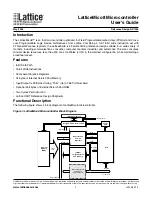
Clock
: A clock generator (CDCI #1) is provided to drive 100 MHz HCSL clock for PCIe add on cards and J721e
SoC. Resistor options are provided to select the clock source for host and end point operation.
For PCIe host operation:
• The add on cards can have clocks driven by SoC or clock generator. Selection can be made through resistors
as shown in
Table 4-16. Reference Clock Selection for PCIe Host Operation
Clock Selected
Mount
Unmount
Reference Clock for SOC from clock
generator
R214
R211, C44
R213
R210, C51
Reference Clock for PCIe connector from
SoC
R211, C44
R214, R54
R210, C51
R213, R56
Reference Clock for PCIe connector from
clock generator
R54
R211, C44
R56
R210, C51
For PCIe Endpoint operation:
• The SoC can have the clock driven by add on cards or clock generator. Selection can be made through
resistors as shown in
Table 4-17. Reference Clock Selection for PCIe Endpoint Operation
Clock Selected
Mount
Unmount
Reference clock for SOC from clock
generator
R214
R211, C44
R213
R210, C51
Reference clock for SOC from PCIe
connector
R211, C44
R214, R54
R210, C51
R213, R56
Hot plug
: The PRSNT1# and PRSNT2# signals are the hot plug presence detect signals. The PRSNT1# is
pulled up and PRSNT2# is connected to GPIO expander, so that PRSNT1# will be pulled low when a add on
card is plugged in as both the PRSNT signals in add on cards will be shorted. Optional resistor is provided to
short the PRSNT1# and PRSNT2# to support host and device mode.
For choosing Host or device operation of PCIe card, the following resistors must be mounted/unmounted as
mentioned in
.
Table 4-18. Resistors for Selecting PCIe Card Host or Device Operation
Mode
Mount
Demount
Host mode
R631
R630
R638
Device mode
R630
R631
R638
J721E EVM Hardware Architecture
SPRUIS4D – MAY 2020 – REVISED MARCH 2022
Jacinto7 J721E/DRA829/TDA4VM Evaluation Module (EVM)
57
Copyright © 2022 Texas Instruments Incorporated
















































